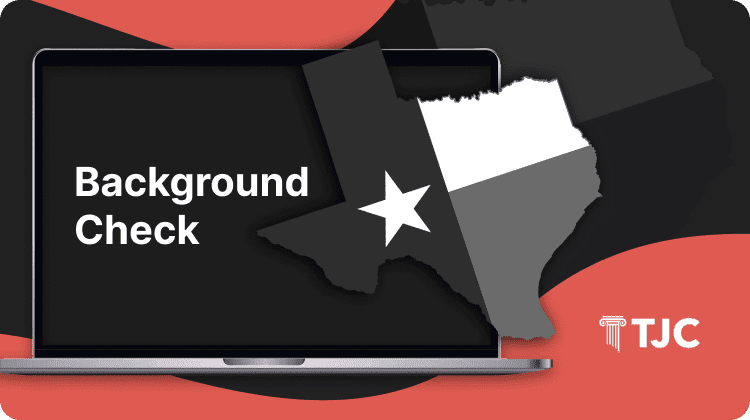Texas has a new law on background checks. It changes how employers, landlords, and individuals use this information. Anyone hiring, renting, or checking a criminal record or history should understand these changes. Let us know what these newly implemented changes are and how they can affect background checks.
Run a Background Check on Yourself
Ensure the accuracy of your personal records
New Texas Law on Background Checks
The Texas administration has implemented a new federal law governing background checks. This law introduces specific provisions that affect how background information can be obtained and used across various sector The new law on background checks in Texas, House Bill 3774, signed into law in 2021, introduces important changes for employers, landlords, and others who rely on background checks. This legislation, referenced as HB 3774, is part of the Texas Government Code and aims to streamline and standardize the process of conducting background checks in the state.
Specifics of the New Law
The new law clarifies the rules for background checks in Texas. It limits the types of information that can be accessed by background checks for employment, ensuring the process is transparent and fair. For example, it specifies which records can be reviewed and under what circumstances.
Key Changes and New Requirements
One of the key changes involves the timeframe for using criminal convictions in background checks. Employers can only consider convictions from the past seven years for most jobs. However, some high-paying roles may allow a longer review period.
Industries and Employers Affected
Industries particularly affected by these changes include those with stringent background check requirements, such as financial services, healthcare, and positions involving vulnerable populations like children or the elderly.
For example, employers in the insurance industry can now perform checks dating back to an individual’s eighteenth birthday if the role involves handling sensitive information or significant financial responsibility. Similarly, residential delivery services must conduct thorough checks for felonies over the past twenty years and misdemeanors over the past ten years.
The broader trend toward more equitable hiring practices is reflected in these changes. A survey by the Society for Human Resource Management (SHRM) found that 92% of employers conduct background checks on job candidates. However, there has been a growing movement to balance safety and fairness, ensuring that past mistakes do not permanently hinder an individual’s career prospects.
Background Checks in Texas: Historical Background
Background checks in Texas have evolved significantly over the years, shaped by both historical context and modern regulatory frameworks. Initially, these checks were primarily used by employers to screen potential hires, aiming to ensure workplace safety and integrity. Over time, their scope expanded to encompass broader societal needs, including housing and public safety.
Texas has strong and varied laws and regulations overseeing background checks. The Texas Department of Public Safety (DPS) oversees the state’s criminal history database, offering authorized users access to extensive records. These databases are essential for employers, landlords, and others to make informed decisions.
In the employment sector, background checks are a standard practice, guided by state laws that dictate what information can be considered and how far back in a candidate’s history employers can look. This ensures fairness and transparency in hiring practices, while also protecting individuals’ privacy rights.
Background checks are crucial in firearm purchases, aiming to prevent firearms from reaching unauthorized individuals. Prospective gun owners must pass checks verifying their eligibility under both federal and state laws, which include reviews of criminal history and mental health records.
Landlords frequently use background checks to evaluate potential tenants’ trustworthiness and suitability. These screenings typically involve assessing the applicant’s criminal record or background, conducting credit checks, and reviewing rental history. The aim is to ensure tenants can fulfill their responsibilities and contribute to maintaining a secure living environment for all residents.
Overall, background checks serve as an essential tool in multiple sectors throughout Texas, balancing the need for public safety and individual rights and privacy. As regulations continue to progress, staying informed about these practices is essential for both employers and individuals dealing with background screening processes.
Current Landscape of Background Checks in Texas
Recent legal changes and ongoing debates heavily influence background checks in Texas, especially regarding firearm purchases. Currently, Texas lacks new state laws for firearm background checks, amid a notable lawsuit involving the Texas Attorney General.
Absence of New State Laws on Firearm Background Checks
In the past two years, Texas hasn’t introduced any new state laws focused on broadening background checks for buying firearms. This legislative inaction coincides with ongoing national talks about gun control and the importance of background checks in curbing gun violence. Despite different suggestions, Texas lawmakers haven’t progressed with new steps to strengthen firearm background checks in the state.
Ongoing Lawsuit by the Texas Attorney General
Texas is currently suing the federal government over efforts to expand firearm background checks. The state argues that recent federal initiatives exceed their authority and violate Second Amendment rights by broadening the criteria and scope of these checks.
Lawsuit Pauses Expanded Firearm Background Checks
A lawsuit has temporarily stopped the expansion of federal background checks for guns in Texas. This legal conflict highlights the ongoing struggle between state and federal governments over gun control. As the case moves forward, it draws a lot of public and political attention, showing the larger national debate on balancing public safety with individual gun rights.
Recent Changes in Texas Background Checks Law
Texas has made several important changes to its background check laws in the past two years. These changes impact employment, gun purchases, housing, and childcare. Here’s a closer look at the new laws and their implication.
Recent Legislative Changes
Texas has passed significant legislation impacting background checks in the last two years. These new laws aim to enhance transparency, ensure safety, and protect individual rights.
Key Legislation Passed in the Past Two Years
- House Bill 1927: The Constitutional Carry Bill allows individuals 21 and older to carry handguns without a license, impacting the necessity and scope of background checks for holding guns.
- Senate Bill 968: Establishes new guidelines for the processing and accessing of background check information, particularly in response to public health emergencies.
Specific Changes Introduced by These Laws
- House Bill 1927: Reduces the requirement for background checks related to carrying handguns, although background checks for purchasing firearms remain intact.
- Senate Bill 968: Introduces measures to protect personal health information and sets protocols for background checks in public health-related employment.
Effective Dates and Implementation Timelines
- House Bill 1927: Effective as of September 1, 2021.
- Senate Bill 968: Implemented in phases throughout 2022, with full compliance required by January 2023.
Changes in Employment Background Checks
Employment background checks have seen new requirements and restrictions to promote fairness and compliance.
- New Requirements for Employers: employers now need to inform applicants about the use of background checks and get their explicit consent. They must also make sure the information used is up-to-date and accurate.
- Restrictions on the Use of Certain Types of Background Information: new laws prevent employers from considering certain background information, such as arrests that did not lead to convictions and old criminal records. They also limit the use of credit history to positions where it is directly relevant.
- Impact on Hiring Practices and Compliance for Businesses: these changes mean businesses must update their hiring practices and ensure they follow the new rules. Employers must train their HR staff on the updated procedures to avoid legal issues.
Changes in Gun Purchase Background Checks
Although there haven’t been any new state or local laws specifically expanding background checks for firearm purchases, procedural updates and collaborations with federal databases have improved the thoroughness of these checks.
- Updates to Procedures and Criteria for Firearm Background Checks: the procedural updates involve stricter verification processes and cross-referencing with national databases to detect disqualifying factors like restraining orders or serious mental health issues.
- Enhanced Scrutiny and New Disqualifying Factors: new disqualifying factors now include broader definitions of domestic violence and mental health-related restrictions. This ensures that individuals posing a risk are barred from purchasing firearms.
- Collaboration with Federal Databases and Cross-State Information Sharing: Texas has enhanced its cooperation with federal databases, making it easier to share information between states for more thorough background checks.
Changes in Housing Background Checks
Tenant screening processes have been revised to ensure fairness and safeguard applicants’ rights.
- New Regulations for Tenant Screening: landlords are now required to adhere to stricter guidelines when conducting background checks. This includes providing applicants with clear explanations if their application is denied based on background information.
- Fair Housing Implications and Protections for Applicants: these regulations emphasize fair housing practices, ensuring that background checks do not discriminate against applicants based on race, ethnicity, or other protected characteristics.
- Changes in Permissible Inquiries and Use of Criminal History: landlords are restricted from using certain types of criminal history information, such as arrests without convictions, in their screening process. This aims to reduce discrimination and provide fairer housing opportunities.
Changes in Childcare Background Checks Year 2023
The childcare sector has seen significant updates to enhance the safety and reliability of background checks.
- New Rule for Listed Family Homes, Employer-Based Childcare, and Shelter Care Operations: as of 2023, new regulations require listed family homes, employer-based childcare, and shelter care operations to conduct more thorough background checks.
- Shift from Name-Based Checks to Fingerprint-Based Checks: the significant change is moving from name-based checks to fingerprint-based checks for specific situations. This guarantees more precise and dependable identification, decreasing the chance of errors and omissions in the background check and hiring process.
Proposals for Future Changes
The landscape of background checks in Texas is constantly changing, with several proposals for future changes currently being considered. These potential changes could further influence how background checks are conducted and used across different sectors.
Pending Legislation
Several proposed bills concerning background checks are currently progressing through the legislative process. These proposals seek to address different aspects of background check regulations, ranging from improving public safety to ensuring fair treatment of individuals.
Overview of Proposed Bills Related to Background Checks
- House Bill 3142: This bill proposes expanding background checks for all firearm purchases, including private sales and gun shows.
- Senate Bill 1125: Aims to establish stricter guidelines for employment background checks, particularly concerning the use of credit history and older criminal records.
- House Bill 2978: Seeks to improve tenant screening processes by limiting the types of criminal history that can be considered and enhancing tenant rights.
Key Provisions and Potential Impacts of These Proposals
- House Bill 3142: If passed, this bill would close loopholes in the current firearm purchase system, requiring comprehensive background checks for all transactions. This could significantly reduce the number of firearms obtained without proper vetting.
- Senate Bill 1125: Introduces restrictions on using outdated or irrelevant criminal records in employment decisions, potentially improving job prospects for individuals with minor or old offenses.
- House Bill 2978: Proposes limiting the use of certain criminal records in housing applications, aiming to prevent discrimination and provide fairer access to housing.
Status of These Bills in the Legislative Process
- House Bill 3142: Currently under review by the House Committee on Public Safety, with hearings scheduled for later this year.
- Senate Bill 1125: Passed the Senate and is awaiting consideration in the House.
- House Bill 2978: In the early stages of review by the Housing and Urban Affairs Committee.
Advocacy and Opposition
The proposed changes to background check laws have received both support and opposition from various groups, reflecting a diverse range of perspectives and interests.
Groups Supporting or Opposing the Proposed Changes
- Supporting Groups:
- Gun Control Advocates: Strongly support House Bill 3142, arguing that expanded background checks are essential for reducing gun violence.
- Civil Rights Organizations: Back Senate Bill 1125 and House Bill 2978, advocating for fairer treatment of individuals with past criminal records and improved tenant rights.
- Opposing Groups:
- Gun Rights Advocates: Oppose House Bill 3142, citing concerns over Second Amendment rights and potential burdens on law-abiding gun owners.
- Business Associations: Express concerns over Senate Bill 1125, fearing increased compliance costs and restrictions on employment practices.
- Landlord Associations: Oppose House Bill 2978, arguing it could limit their ability to screen tenants effectively and ensure property safety.
Arguments and Rationale from Both Sides
- Proponents:
- Gun Control Advocates: Argue that comprehensive background checks are crucial for public safety, preventing firearms from falling into the wrong hands.
- Civil Rights Organizations: Emphasize the importance of second chances and reducing discrimination against individuals with minor or outdated criminal records.
- Opponents:
- Gun Rights Advocates: Claim that expanded background checks infringe on constitutional rights and may not effectively prevent crime.
- Business Associations: Highlight potential administrative burdens and the need for flexibility in employment practices.
- Landlord Associations: Stress the importance of thorough tenant screening to maintain safe and secure rental properties.
Public Opinion and Stakeholder Reactions
Public opinion on these proposed changes is mixed, with strong feelings on both sides. Many Texans favor measures that improve public safety and fairness, while others worry about potential overreach and unintended consequences. Stakeholders, such as advocacy groups, industry representatives, and the general public, are actively involved in discussions and debates as these bills move through the legislative process.
Notable Court Cases and Legal Challenges
The legal landscape surrounding background checks in Texas is influenced significantly by court decisions and ongoing legal battles. Here’s an overview of recent court cases and pending legal challenges that are shaping the current state of background check laws.
Recent Court Decisions
Recent court decisions have had a profound impact on the implementation and interpretation of background check laws in Texas.
Significant Court Rulings Affecting Background Checks in Texas
- Smith v. Texas Department of Public Safety: This case addressed the accessibility and accuracy of criminal records through the Texas Department of Public Safety (DPS). The court ruled in favor of enhanced transparency and accuracy in background check procedures, impacting how criminal records are accessed and utilized.
- Doe v. Landlord Association of Texas: This landmark case involved allegations of housing discrimination based on background check results. The court’s decision underscored the importance of fair housing practices and the proper use of background information in tenant screening.
Analysis of the Legal Reasoning and Outcomes
In both cases, the courts emphasized the balance between public safety concerns and individual rights. They highlighted the need for clear guidelines on the use of background information to prevent discrimination and ensure accuracy. Legal reasoning focused on upholding constitutional rights while promoting transparency and fairness in background check practices.
Implications for Current Laws and Practices
These rulings have impacted existing laws by emphasizing the significance of following fair housing and employment practices. They have prompted changes in how background checks are performed and assessed, ensuring alignment with legal standards while safeguarding individuals’ privacy rights. These outcomes highlight the continuous development of background check laws in response to legal disputes and societal calls for fairness and justice.
Pending Court Cases
Several pending court cases are set to further influence the landscape of background checks in Texas, addressing crucial issues and potential reforms.
Overview of Ongoing Legal Battles Related to Background Checks
- Texas v. Federal Government: This high-profile case challenges federal efforts to expand background checks for firearm purchases in Texas. The state argues that these measures infringe upon state sovereignty and individual Second Amendment rights.
- Employee Rights Coalition v. Texas Employers Association: This case involves allegations of discriminatory employment practices based on overly stringent background check policies. The outcome could impact how employers in Texas approach background checks and hiring practices.
Key Issues at Stake and Potential Ramifications
- State vs. Federal Jurisdiction: The Texas v. Federal Government case raises significant questions about the extent of federal authority over state background check laws, with potential ramifications for gun control measures nationwide.
- Employment Practices: Employee Rights Coalition v. Texas Employers Association addresses the balance between employers’ right to protect their business interests and employees’ rights to fair treatment under background check policies.
Expected Timelines for Decisions and Possible Outcomes
Decisions in these cases are expected within the next year, with potential outcomes ranging from upholding current laws to implementing significant reforms in how background checks are regulated and conducted in Texas. These rulings are likely to influence legislative initiatives and regulatory frameworks, shaping future discussions and policy decisions regarding background check practices.
Need a Background Check?
Get StartedImpact on Various Stakeholders
The evolving landscape of background checks in Texas has wide-ranging implications for different stakeholders, from employers and businesses to individuals seeking employment and law enforcement agencies. Here’s a detailed exploration of how these changes are affecting each group.
Employers and Businesses
Compliance Challenges and Best Practices
With stricter regulations and evolving legal standards, businesses must navigate compliance challenges to ensure their background check processes adhere to state and federal laws. Best practices include:
- Clear Policies and Procedures: Establishing transparent policies that outline the purpose and scope of background checks.
- Consent and Disclosure: Obtaining explicit consent from applicants and providing clear disclosures about the use of background information.
- Regular Training: Training HR personnel to ensure they understand and implement compliant background check practices.
Changes in Liability and Risk Management
The introduction of new laws impacts liability and risk management for businesses:
- Reduced Legal Exposure: By following updated regulations, businesses can mitigate risks associated with discriminatory hiring practices or privacy violations.
- Legal Consultation: Seeking legal advice to stay informed about legal changes and ensure compliance with evolving background check laws.
Individuals and Job Seekers
New background check laws in Texas provide enhanced rights and protections for individuals entering the job market.
New Rights and Protections Under the Law
Job seekers now benefit from increased protections against unfair hiring practices:
- Limitations on Inquiry: Restrictions on the use of certain types of background information, such as non-convictions or older records, protect individuals from discrimination based on past incidents.
- Transparency Requirements: Employers must provide clear explanations if adverse decisions are based on background check results, allowing individuals to challenge inaccurate information.
Strategies for Navigating the Background Check Process
Navigating background checks effectively involves:
- Understanding Rights: Knowing what information employers can legally consider and ensuring information provided is accurate and up-to-date.
- Preparing Explanations: Being prepared to explain any past incidents or discrepancies that may arise during a background check.
Law Enforcement and Public Safety
Background check regulations in Texas impact law enforcement agencies and public safety efforts.
Effects on Crime Prevention and Community Safety
Background checks play a crucial role in crime prevention by:
- Identifying Risks: Identifying individuals with criminal histories or disqualifying factors from accessing sensitive roles or firearms.
- Enhancing Public Safety: Ensuring that individuals entrusted with public safety roles, such as law enforcement officers and first responders, meet stringent background criteria.
Collaboration with Federal and State Agencies
Collaboration between Texas law enforcement and federal agencies enhances:
- Information Sharing: Cross-referencing databases and sharing information to improve the accuracy and comprehensiveness of background checks.
- Compliance with Standards: Ensuring background checks meet federal standards while respecting state-specific regulations.
Conclusion
Texas background check laws have introduced new regulations and requirements affecting various sectors. These changes include stricter guidelines for employment background checks, limiting the use of outdated or non-conviction records, and expanding the scope of tenant screening processes to ensure fair housing practices. Additionally, updated procedures for firearm background checks now require more comprehensive vetting, aligning state practices with federal standards to enhance public safety.
Staying informed about these changes is crucial for all stakeholders. Employers must navigate new compliance challenges to avoid legal repercussions, while individuals benefit from enhanced protections against discrimination. Law enforcement agencies continue to collaborate with federal and state bodies to ensure background checks are thorough and accurate, contributing to community safety.
Compliance with these evolving laws is essential for maintaining legal integrity and fostering a fairer, more transparent environment. Regularly monitoring updates, adopting best practices, and seeking legal guidance can help stakeholders stay ahead of regulatory changes, ensuring that background check processes remain fair, accurate, and aligned with legal standards.





